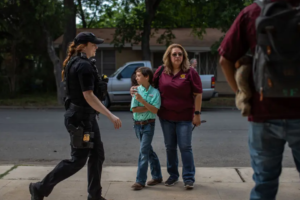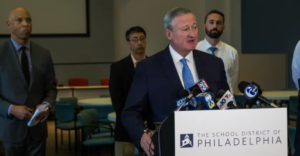During Janice Jackson’s tenure at the helm of Chicago Public Schools, the district continued an encouraging trend: An ever-growing portion of its students graduated from high school and continued on to college.
But increasing the number of students who actually finish college has been a more elusive goal for the district. In her new role, Jackson, who stepped down as CEO this past summer, hopes to attack the key obstacles that trip students up on their way to a degree or postsecondary credential.
She signed on to lead a new nonprofit, Hope Chicago, which has a goal of ushering 30,000 Chicagoans to college or trade school graduation over the next decade, at an estimated price tag of $1 billion. In a rare approach, the organization will open up financial support not only to recent high school graduates, but also to their parents or guardians.
The scholarships will cover tuition and other academic expenses, as well as food, housing, and other bills that can sometimes derail students’ college journeys. And they will come with counseling and other mental health support to combat stress and loneliness, which can also get in the way of graduation, especially for first-generation college students.
Jackson spoke with Chalkbeat Chicago about what sets her new venture apart from more established scholarship models and the advice she gave to her successor, Pedro Martinez.
Why launch a scholarship program that offers support not only to recent graduates, but also for their parents and guardians?
This was actually one of the reasons why I chose this as my next option. What really hooked me was exactly this notion of inviting parents to go back to get a two- or four-year degree or a postsecondary credential. We’ve not done it here in the city. We put a lot of attention on our students, and rightfully so because they’re young, and they have so much potential. But where I see the city falling short sometimes is we don’t have a lot of opportunities for parents — parents who may not have chosen college fresh out of high school for a variety of reasons, but now have a family and want more opportunities.
I also think the timing is perfect as we are coming out of this pandemic. For 20 years, we’ve been trying to get colleges to look at affordability. The pandemic forced people to pay attention to that. Students are more discerning about college, the cost of it. The other thing that has happened is that a bunch of organizations can’t fill jobs. I’m talking to organizations that are saying, “Let’s build a program for parents. We have 2,000 jobs. How do we build something so we can train residents and get them into jobs within a year?” We’re really helping whole families, which I don’t think we’ve tried before here. I think it’s going to work.
I know the program here is modeled after a similar program in Toledo. What do we know about the level of interest among parents and the other outcomes from that program?
They’re in their second year. What they’ve learned so far is that about 25% of the parents raise their hands and say, “I want to go back to school right away.” What we learned from them is that at the moment a parent says, “I want to go back,” that’s when the support has to start. We’re going to create best practices and document them. But I think our program is a little bit more expansive than Hope Toledo in that we are looking at trade programs and partnerships with employers. We think over the next 10 years, about 8,000 parents are going to take us up on those offers. I honestly think it’s going to be more and will fall into the good-problem-to-have category.
I understand Hope Chicago will be working to identify specific schools to partner with. How will you go about picking those schools, and can students from other schools apply for scholarships?
We want parents and students to know that if you get into college, we’re going to support you. We’ll have a minimum amount that we will give to students to help them with expenses. If your gap is $15,000, we got to figure out how to close that gap. Part of it will come from Hope. But the other part is that those universities are going to help us close the gap. I would love to do this in every single CPS school. But we have to start with a subset of schools, based on fundraising.
So we have selected a subset of CPS schools, which I cannot say right now, because obviously we want to do a big reveal. We picked high-needs schools and communities. We also looked at leadership, both the principal leadership as well as the postsecondary leadership in those schools. There are phenomenal counselors and postsecondary teams working their tails off to get kids into college, and we want to go in and support that and take it to the next level. Each year, the goal is to bring on more CPS schools as we continue raising money and proving our model.
Students who have had involvement with the criminal justice system will not be disqualified from getting a scholarship, as they sometimes are with other programs. Why is that important?
Hope is about helping everybody. If we don’t help kids who are justice-involved, we’re already given up on them. We shouldn’t be surprised 10 years from now that their record is longer or they haven’t gotten a job to take care of their families. A lot of students who get involved with that kind of activity early on are leaders, and we need to take those leadership abilities and apply them in a space where they can be successful.
But we’re also going to help some of those parents who may have made mistakes early in life. It’s hard to get a job if you have a (criminal) background. We want to say to employers, “Let’s look at the background check process.” We’ve got a lot of people with low-level offenses that are 10 years old who can’t get jobs. At what point do we let people off the hook and let them take care of themselves and their families?
You mentioned that something that distinguishes Hope Chicago is the intentional focus on opening up opportunities to attend career and technical education (CTE) programs. What are the barriers students face to access these programs?
When I was a student in CPS, we didn’t have a strong college-going culture. That’s one of the things that has changed in the district in the past 20 years. We went from not having a college-going culture almost to the extreme, where that’s all we talked about. What we learned is the same skills that students need to successfully complete high school they need to access these CTE programs. That’s one place where the district has to continue to do more. Some of the programs are outdated. During my time as CFO and CEO, we made a lot of changes. Some of these programs were popular. Some of them weren’t. Looking at automotive tech, for example, we do not fix cars the way we fixed cars 20 or 30 years ago. If kids want to go into that, they have to get some sophisticated computer skills. We have to move away from the debate over college versus career because the reality is we should be making sure that kids have options to do both.
What advice have you given new CPS CEO Pedro Martinez about prioritizing his very long to-do list?
First, I was happy that he got the job. It was a great night’s sleep, knowing that a competent person from Chicago, who cares about our district and our city, was going to be leading. I gave him a lot of advice. One, keeping students first. That sounds good, but it’s hard to do, because sometimes the interests of adults take precedence, and the kids are the ones who lose out. I was candid with him about the need to continue to work around equity. I think the establishment of the equity office, which reports directly to the CEO, sends a strong message.
To be quite honest, I urged him to really make sure that the interests of Black children are upheld. I think that you have to be a champion around that because when we look at all the data, our African American students are always trailing. If we get it right for them, everybody benefits. LaTanya (McDade, the district’s former chief education officer) and I were fierce advocates around equity and high expectations for Black kids. That has to continue.
This article was originally posted on 6 questions for former Chicago schools chief Janice Jackson about her new chapter






Be First to Comment